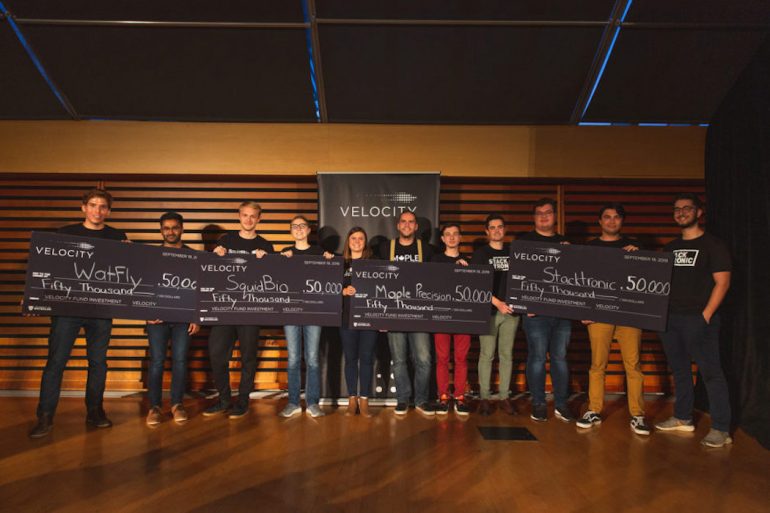Four early-stage startups were all crowned the winners of the 25th Velocity Fund Pitch Competition this week, which was hosted in Toronto for the first time.
Maple Precision, SquidBio, Stacktronic, and Watfly took home prizes of $50,000 each from the competition, which aims to cultivate and support emerging early-stage startups, as well as expose them to a greater pool of capital and talent. This year’s event saw over 250 attendees and ten finalists that pitched and competed for one of four $50,000 investments.
“We’re thrilled to support and fund the four winning startups and their founders.”
“After 25 competitions, we continue to showcase the best from across Canada, proving our dedication to highlighting today’s most forward-thinking innovators,” said Jay Shah, Velocity’s director of startups. “We’re thrilled to support and fund the four winning startups and their founders, and we look forward to the next pitch competition.”
Each of the four winners also received in-kind intellectual property legal services and a provisional patent application. The startup finalists were able to showcase their companies to over 60 investors who were in attendance. Over the past 24 series, the competition has produced 91 $25,000 grant winners and four $50,000 investment winners. Velocity said, together these companies are now worth over $1 billion.
Judges from the competition included Alex Iskold, co-founder and managing partner of 2048 Ventures, Victoria Birkett, partner at Innovation Grade Ventures, Prashant Matta, partner at Panache Ventures, and Mohan Markandaier, managing partner of Good News Ventures.
RELATED: Velocity to split up offering with separate, student-focused incubator
Maple Precision, one of the pitch competition’s winners, set out to provide farmers with data that will increase confidence when it comes to making big decisions on the field. Founded by CEO Rebecca Swabey, Maple Precision finds and organizes spatial data, supplying affordable positioning solutions centred around Global Navigation Satellite System receivers.
SquidBio has created a device that allows for rapid prototyping of synthetic biology, aiming to make personal DNA printing faster, cheaper, and more reliable. Founded by Isaac Ellmen and Danielle Rose, the company has also received support from Velocity Science.
Stacktronic is developing a scalable, flexible, and modular battery platform for electric vehicles. The company aims to simplify and expedite the design of batteries for electric powertrains, allowing any vehicle, of any size, and any production volume, to be battery-powered in an instant. The company was founded by Riley Stone, Nicolas Benais-Thomson, Ethan Hamshaw, and Keith Teeple.
Finally, Watfly, founded by mechanical engineering students Abinesh Chandrasekhar and Gonzalo Espinoza Graham, is developing an urban electric flight solution to combat traffic. The team hopes to be the first to bring flying cars to the masses and is currently working on a prototype. The Watfly team also won $5,000 at the Velocity Fund $5K Finals.
Image courtesy Velocity


